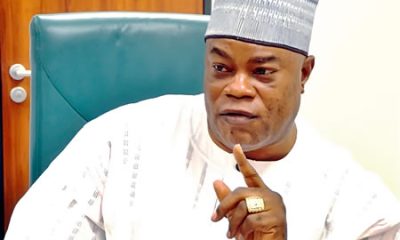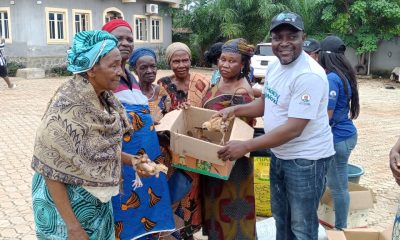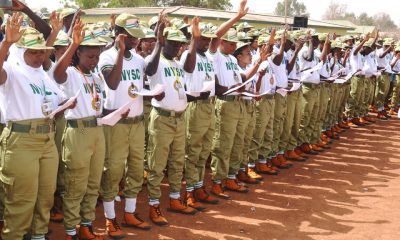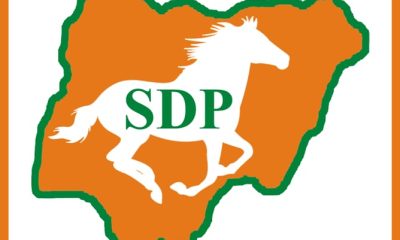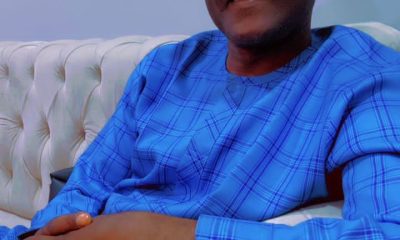OPINION
Olympics: Team Nigeria Ready to Compete among World’s Leading Athletes
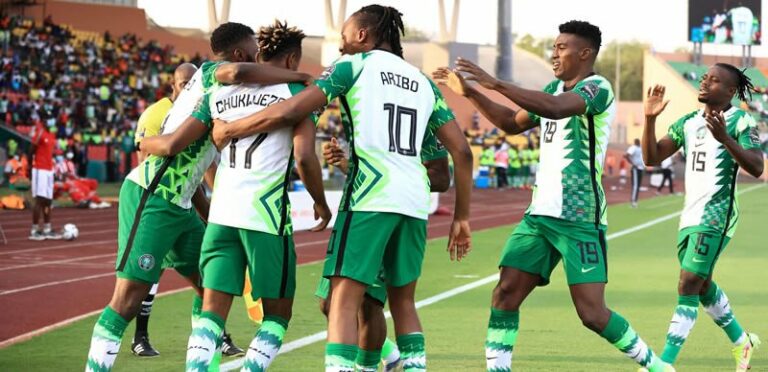
By Olanrewaju Akojede
Team Nigeria will begin a fresh phase of participation when the 2024 Paris Olympic Games begin on July 26 in Paris, France.
The Paris Olympics, which is its 33rd edition, is scheduled to end by Aug. 11 while the Paralympics is expected to hold from Aug.
28 to Sept. 8.Nigeria’s target is to put up a master class performance akin to its famous outing at Atlanta 96 Olympics where the country garnered six medals at the Games.
Nigeria is fielding a strong team of 82 sportsmen and women who will compete in 11 sports at the 2024 Games in Paris.
Track and Field is leading the contingent in terms of numbers with 32 athletes, consisting of 14 males and 18 females at the Games.
Nigeria will also be represented in Basketball, Badminton, Boxing, Canoeing, Cycling, Football, Table Tennis, Taekwondo, Weightlifting and Wrestling at the Paris Olympics.
With a total medal haul of two gold, one silver and three bronze at the 1996 Games in Atlanta, the country’s performance till date remained the first and only time that Team Nigeria won two gold medals in the Olympics.
Leading the medal zone was a fantastic brilliance of Chioma Ajunwa, who leaped to a 7.12 metres to set the record as the first West-African female athlete and the first Nigerian to win an Olympic gold medal in track and field.
Nigeria also created another memorable record by winning another gold medal in the male football event against all odds and against the big guns in the sport such as Brazil and Argentina.
Nigeria’s football team, tagged the ‘Dream Team’, was led in that epoch-making event by Kanu Nwankwo, the then African Footballer of the Year.
The team comprised other football greats such as the mercurial midfielder, Austin Okocha.
Their defensive wall was marshalled by Taribo West, Uche Okechukwu, Sunday Oliseh, and Celestine Babayaro, with attacking power play of Daniel Amokachi, Wilson Oruma and speedy winger Emmanuel Amuneke among others.
They went on to record an incredible comeback 3-2 win over Argentina in a dramatic final and claimed their first-ever gold in football at the Olympics.
Other success stories at the 1996 Olympics included a silver medal in the women’s 4x400m with the quartet of Falilat Ogunkoya, Olabisi Afolabi, Fatima Yusuf and Charity Opara.
Also, Nigeria’s woman of candour in sprints, Mary Onyali, powered to a silver podium finish in women’s 200m, while her compatriot, Ogunkoya, won a bronze in the women’s 400m.
Ace boxer Duncan Dokiwari won a bronze medal as well.
Since that historic performance about 28 years ago, subsequent performances in the quadrennial Olympics had been measured by the performances in the 1996 Games.
Till date, for Nigeria, no Olympics show has outperformed the 1996 spectacle.
Indeed, Nigerians had wondered why subsequent Team Nigeria failed to replicate the feat recorded at 1996 Olympics.
While the flag-off of the 2024 Olympics remains just a few days to go, Nigerians are, no doubt, expecting the present squad of 82 sportsmen and women to equal and surpass that record.
Nigeria’s powerful squad in athletics is led by the country’s Queen of the track and World Record holder, Oluwatobiloba Amusan, in company of Rosemary Chukwuma, Favour Ofili, Tima Godbless, Ella Onojuvwevwo in Women’s 400m as well as Esther Joseph, at the Games.
Others in the mix include Ruth Usoro (Women’s long jump); Ese Brume (Women’s Long jump); Prestina Oluchi Ochoogor, Obiageri Amaechi (Women’s discus); Ashley Anumba, Chioma Onyekwere, Oyesade Olatoye (Women’s hammer throw); Women’s 4×100 metres Relay and Mixed 4×400 metres relay.
Nigeria’s Super Falcon also returns to the show in the Football event with an 18-woman squad after several years’ absence.
The Super Falcons, in a tough group with Champions Spain, Brazil and former world champions Japan, are, however, tipped for a podium finish at the Games in spite of the odds against them.
According to the Secretary-General of Nigeria Olympic Committee (NOC), Tunde Popoola, Nigeria has a strong football team to scale through their group.
”Also, we expect medals in Athletics, Weightlifting and Wrestling. We will surprise Nigerians with bags of medals,” he said.
Another female team, D’Tigress will also aim to better their record in the female orBasketball event with their 12 players on parade.
Nigeria will also parade three boxers to be led by Olaitan Olaore, who aims for a good show in men’s heavyweight; Dolapo Omole, who will also compete in men’s featherweight category; and Cynthia Ogunsemilore, who reigns in the women’s lightweight class.
It is worthy of note that, for the first time since 2016, Nigeria will send three boxers to the Olympics
Also, Nigeria will have high hopes in Weightlifting relying on the form of Rafiatu Lawal and Adijat Olarinoye.
The 24-year-old Olarinoye is not new on the world stage as she has earlier won gold at the Commonwealth Games in Birmingham two years ago.
She will seek to make Nigerians proud at a bigger podium at the Paris Olympics.
In other sports Nigeria will have two women in Canoeing, one female representative in Cycling while Aruna Quadri with Olajide Omotayo will lead the men in table tennis alongside Offiong Edem and Fatima Bello in the women’s category.
Taekwondo will also feature one female; Weightlifting will have two females while Wrestling will have a male and five females for a total of six athletes.
Team Nigeria will be fielding 20 males and 62 females at the Paris games.
The Minister of Sports Development, Sen. John Owan-Enoh, knowing the task ahead and the need for Nigeria to improve on their performance has been talking and doing the work to get the athletes in top shape ahead of the quadrennial games to be hosted by France.
At the presentation of N100 million donated by the House of Representative members, the minister said that the aspiration of the ministry was to surpass the previous best Olympic record achieved in 1996, at the 2024 Olympic Games in Paris.
He also said that the cash contribution from the House of Representatives would go to athletes.
He also announced increased allowance and bonuses will accrue to the athletes.
Owan-Enoh said,”Just like it was with the African Games in Accra, Ghana, I will spell out from A-Z, the entitlements for our athletes.
”My aspiration is for the nation to surpass our previous record from our best Olympic Games performance in 1996.
”We’ve been working on this goal through our preparations, arrangements, and performance team working with athletes in Germany. I am getting reports on the progress every day.”
”We want to get our athletes to feel appreciated and wanted by our country.”
He also said,” The entire N100 million donations from the Federal House of Representatives will entirely go to the athletes.”
In addition to this, athletes will receive local camping allowance, foreign training grants, foreign training camp allowances, Olympic Games allowances, and winning bonuses.
The Minister also told newsmen in Abuja that the Federal Government had approved more than N12 billion for Team Nigeria at the 2024 Paris Games.
The Minister’s commitment to transparency and support for the athletes underscore the federal government’s dedication to ensuring Team Nigeria’s success at the Games.
As the clock ticked within a few days to the Paris 2024 Olympic Games, Owan-Enoh said that his ministry, as the supervising arm, was ticking all the boxes.
He said that the atmosphere was frenetic and excitement palpable as showmanship and calisthenics set the stage for the 2024 Olympic Games in Paris, France.
He said that Team Nigeria is in top spirits as it prepares to fly its colors at this quadrennial sporting showpiece of global attention.
He also said that Nigeria’s contingent encompasses talented and world-class athletes who are set to take the world by storm.
He said, ”With several months of preparation and training, athletes such as Oluwatobiloba Amusan, Ese Brume, Blessing Oborodudu, the two Favours (Ashe and Ofili), Odunayo Adekouroye, Chukwuebuka Enekwechi, Aruna Quadri, among other names too numerous to mention, the nation flies to Paris with strong hopes.”
Sen. Owan-Enoh also urged Nigerians to throw their weight behind the nation throughout the Games.
”Our athletes are putting in tremendous effort and dedication in their preparations.
”We are confident that with the support of every Nigerian, our team will excel and make the nation proud,” he said.
Owan-Enoh said that following the domestic camping, the contingent proceeded on foreign camping to acclimatise, focus and step up preparations for the Games.
”The Super Falcons camped in Spain, while the other athletes camped in Saarbrucken, Germany,” he said.
He also said that the prioritisation of the welfare of athletes had been demonstrated by the increase in bonuses and allowances payable to them.
”Additionally, domestic camping allowances, foreign training grants, foreign training allowances, Olympic Games allowances, and winning bonuses will be given to ensure our athletes are well-supported.
”Let’s unite in support of our athletes as they embark on this remarkable journey.
”Our aspiration is not just to participate but to excel and bring home the medals,” Owan-Enoh said. (NAN)
OPINION
New Wave of Malnutrition and the Road to 2027
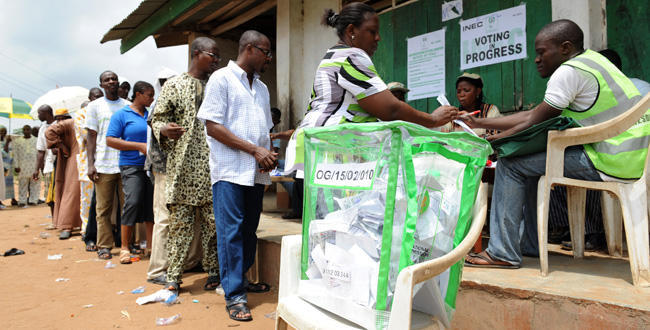
By Dakuku Peterside
As the political season begins in Nigeria ahead of the 2027 elections, we are beginning to see another round of promises, slogans, and declarations of vision. Billboards will soon rise, rallies will be held, and political actors jostle for public attention.
But beneath this loud, choreographed performance, a quieter tragedy unfolds in the country’s northern belt — children are wasting away, not in war, not in displacement, but in silence. The contrast is jarring while politicians vie for airtime, a grave, slow-motion emergency is eroding the potential of an entire generation. Across northeast and northwest geopolitical zones, severe acute malnutrition has reached levels comparable to what is often seen in war times. Yet no formal war is raging. Instead, an absence of attention, of priority, of leadership is doing the damage.I first sensed the scale of that dissonance on a sweltering July afternoon in my visit to one of the northern states. A nurse at a community health post held up a measuring tape — green for health, red for danger — around the twig‑thin arm of a three‑year‑old girl. The dial fell deep into crimson. “We see wartime numbers,” the nurse whispered, shaking her head, “but there is no war.” That single sentence captures the moral puzzle now facing Nigeria: How can such devastation grow in the relative calm of peacetime?In clinics scattered across the North, community health workers continue their daily rituals: measuring the circumference of toddlers’ arms, documenting weight loss, and trying, with limited resources, to stem a tide of hunger that has outpaced both state responses and national outrage.According to the International Committee of the Red Cross, over 3.7 million people are acutely food insecure in northern Nigeria. However, this figure, as dire as it is, likely underestimates the accurate scale of the crisis. Many remote villages receive no formal visits, no surveys, no clinical screenings — only the steady arrival of hunger and poverty. Factor them in, and the count edges toward five million. Even these aggregates blur the lived reality. In Zamfara’s dusty hamlets, entire households survive on a single meagre meal; in Yobe’s IDP camps, mothers dilute porridge to stretch one cup for three children.The UN Office for the Coordination of Humanitarian Affairs (OCHA) had warned that in 2024 alone, more than 700,000 children in the region suffered from severe acute malnutrition (SAM), with over 100,000 of them at imminent risk of death without urgent medical intervention.The figures in 2025 will be even more staggering, given the recent evidence of malnutrition in the area. Médecins Sans Frontières (MSF), also known as Doctors without Borders, has raised alarm over the growing number of malnourished children in Nigeria, revealing that it admits more than 400 cases daily in Kebbi State alone.Malnutrition is rarely dramatic — it arrives in shrunken bellies and dulled eyes, in children too tired to cry and mothers too weak to breastfeed. It creeps in through drought, displacement, conflict, food inflation, and broken systems. And because it does not explode, it often does not make headlines. Unlike terrorism or natural disasters, it is quiet. But it is just as deadly. Every single day in Nigeria, approximately 2,300 children under five die, and malnutrition is a contributing factor in nearly half of these deaths.The painful truth about this crisis is its preventability. Hunger in northern Nigeria is not a natural disaster, but a consequence of a system that values political optics over structural reform. During campaigns, politicians often launch food drives and cash transfers with great fanfare — short-term gestures that provide immediate relief and long-lasting headlines.However, these interventions are rarely part of a long-term strategy. They do not enhance food production, maternal health, access to clean water, or early detection systems. There are no incentives to invest in reforms that take years to show results. Why build resilience when elections are won by what people can see now?The cost of ignoring malnutrition is profound and enduring. A stunted child is not just a personal tragedy but a national one. Nigeria has the second-highest burden of stunted children globally, with an estimated twelve million under the age of five affected by chronic undernutrition.Nearly one in three Nigerian children is stunted, which means their physical and mental growth is permanently impaired. These children will likely do worse in school, earn less over their lifetimes, and face greater risks of chronic illness. The World Bank estimates that malnutrition can reduce a country’s GDP by up to 11 per cent when you account for lower productivity, higher health costs, and lost potential.Every untreated case of malnutrition is an invoice deferred to the future. Neuroscientists remind us that the first 1,000 days of life shape the brain’s wiring. A stunted child may never fully catch up cognitively, no matter the quality of later schooling. Economists convert those impairments into lost productivity, estimating that Nigeria could be forfeiting 2 to 3 per cent of its GDP annually.Public‑health accountants tally the hospital admissions for pneumonia and diarrhoeal disease that soar when immune systems are starved of zinc, iron, and vitamin A. Sociologists track the link between food scarcity and unrest, noting how hunger can erode social trust faster than any televised grievance. Put differently: malnutrition is not just a humanitarian concern — it is a stealth saboteur of national security, economic diversification, and educational reform. Ignore it, and every other development target becomes more complex and more expensive to hit.Children who come to school hungry are less likely to concentrate, more likely to drop out, and far less likely to escape poverty in adulthood. In northern states like Kebbi and Zamfara, school absenteeism is often directly linked to hunger. According to UNICEF, 70 per cent of school-age children in food-insecure households miss more than three days of school a month. The cycle is cruel and self-reinforcing: hunger leads to poor learning, which in turn leads to unemployment and poverty; poverty then feeds back into hunger.And yet, there are glimmers of what is possible when leadership is guided by vision and conscience. A state in the southeast has introduced a “one balanced diet a day” policy for all school-age children, recognising the devastating effects of hunger on education, health, and long-term human capital.This singular act, although modest in scale, presents a transparent and replicable model that other states should adopt urgently. It shifts nutrition from being an emergency response to a daily, institutionalised commitment, integrating school feeding with agricultural and health systems.Already, early evaluations show improved school attendance, weight gains in children, and even local economic stimulation through the sourcing of produce from nearby farms.Dr Ali Pate, Nigeria’s Coordinating Minister of Health and Social Welfare, is leading a comprehensive national effort to combat malnutrition as a public health emergency. His multi-sectoral approach combines immediate treatment with long-term prevention strategies.Treatment centres equipped with locally produced, ready-to-use therapeutic foods (RUTF) have been established in the northeast and northwest, achieving recovery rates of up to 90%. Funding has significantly increased, with $11 billion allocated by the federal government and an additional $60 million from UNICEF to support healthcare infrastructure and nutrition programs.Community-level early detection systems using MUAC tapes are being scaled up, and over 40,000 health workers are being trained to identify and manage malnutrition. Through the National Strategic Plan of Action on Nutrition and the N774 programme, nutrition services now reach most local government areas.Nationwide implementation of standardised guidelines, micronutrient supplementation, food fortification, and public nutrition education campaigns has reached many caregivers. Crucially, Dr. Pate has unified efforts across ministries and sectors through a central coordination platform, accompanied by new accountability mechanisms, to track progress and ensure sustainability.What is a pragmatic roadmap between now and 2027? Make nutrition politically contagious. Party manifestos must feature explicit, budgeted nutrition targets — malnutrition cannot survive the scrutiny of voters. Scale what already works.Community Management of Acute Malnutrition (CMAM) programmes, when fully funded, can treat a child for less than the daily cost of a campaign rally. Mandatory fortification of flour, cassava, and cooking oil can reach millions silently and efficiently — re-engineer agriculture for climate reality. Drought‑tolerant millet varieties, solar‑powered boreholes, and warehouse‑receipt systems to curb post‑harvest loss will outlast any campaign poster. None of these actions requires reinventing the wheel. They demand, instead, a political imagination wide enough to see past the next podium.Still, the work ahead remains monumental. These initiatives, while promising, must be scaled aggressively and protected from the shifting winds of politics. If Nigeria is to stand any chance of reversing the tide of child malnutrition, this moment—this narrow window between now and 2027 — must become the tipping point.Every state must follow the example set by Anambra. Every governor must internalise that a child fed today is a citizen empowered tomorrow. Every candidate must treat child nutrition not as a talking point but as a policy cornerstone.If Nigeria’s political class decides that malnutrition is not a side issue but the central test of stewardship, the nascent election season for the 2027 elections could mark the start of a renaissance in child survival and, by extension, national renewal. The road is narrow, the window short. Yet history is replete with moments when political will, once awakened, turned statistics into stories of recovery.The children of northern Nigeria deserve that pivot — deserve to swap the colour red on a measuring tape for the bright green of health, growth, and possibility. If Nigeria’s political class truly wishes to build a country that works for all, it must start by ensuring no child falls through the cracks of neglect. Let the road to 2027 be paved not just with promises, but with full bellies, thriving children, and a generation finally given a fair start.Dakuku Peterside, a public sector turnaround expert, public policy analyst and leadership coach, is the author of the forthcoming book, “Leading in a Storm”, a book on crisis leadership.OPINION
Super Falcons: Queens of Africa

By Reuben Abati
Nigeria’s senior female soccer team, the Super Falcons are the Queens of Africa given their superlative, dominant and creative performance, their resilience, and agility at the just concluded Women’s African Cup of Nations (WAFCON) organised by the Confederation of African Football (CAF) in Morocco, 5–26 July.
Since the inception of the tournament in 1998, the Super Falcons have won 10 times out of the 13 times that the event has held: 1998, 2000, 2002, 2004, 2006, 2010, 2014, 2016, 2018, and now 2024, missing the trophy only thrice in 2008, 2012 – won by Equatorial Guinea, and in 2022 – South Africa. Ahead of the 2024 WAFCON in Morocco, the manager of the team, Justin Madugu had declared that they were going on a Mission X, that is to win the trophy for a record 10th time.Their victory is the accomplishment of that dream, and a reaffirmation of Nigeria’s supremacy in female football. But the road to that moment was in no way easy. The Falcons beat Tunisia, 3-0 in their opening match, and further defeated Botswana 0-1 to get to the competitions’ knock-out stage.The next match against Algeria was a goalless draw, but the Falcons had enough points to go through to the quarter finals, having led Group B. Their next opponent was the Copper Queens of Zambia, who had led Group A, and were supposed to be something of a threat.The Super Falcons trounced them 5–0. Then they got to the semi-finals to face defending Champions, and a rival team, the Banyana Banyana of South Africa. It was a nail-biting, nerve-wracking, tension-soaked match. The South Africans were determined.Nigeria scored through a spot kick in the 45th minute converted by team captain Rasheedat Ajibade. In the 60th minute, the South Africans also levelled the score through a penalty kick making the match 1-1. It looked as if the game was heading for extra time, until Michelle Alozie scored in the 94th minute turning a pass from Esther Okoronkwo into a dramatic win for the Falcons.The final match on Saturday, 26 July was no less stunning. The Falcons were trailing 2-0 down by the end of the first half, in front of a crowd of Moroccans solidly behind their home team. It was a different ball game, however, in the second half.The Falcons returned to the pitch fighting as if their lives were at stake. Esther Okoronkwo scored against the Moroccans in the 63rd minute, Folashade Ijamilusi followed up with another goal in the 71st minute, and in the 88thminute Jennifer Echegini, settled the matter with a Nigerian goal that was celebrated across the country.It was an amazing comeback, reminiscent of the Miracle of Damman in 1989, when during the quarter final match between Nigeria’s U-20 football team, the Flying Eagles came back from four goals down to beat the USSR team and went on to win the match subsequently on penalties, 3-5. Women’s football has grown in Africa, and Nigeria’s Super Falcons are the Queens.It is instructive that the individual and collective talent of the Super Falcons is now being rated against the capability of the Super Eagles. Failure is an orphan; success has many parents. This is in part the trite lesson of the Miracle of Rabat.The Falcons returned home yesterday, touching down at the Nnamdi Azikiwe International Airport, Abuja at approximately 2:26 pm. to a well-appointed celebration in the Federal Capital Territory, Abuja, in an open-bus parade across the city before presenting the trophy to President Bola Ahmed Tinubu, his wife and other senior government officials at the Presidential Villa.The President had told the Super Falcons that he was waiting to receive the trophy, and he played his part by ensuring that bonuses and allowances for the Falcons were duly paid, but this team didn’t play for money. They played for glory and they brought honour home. They brought history home too, creating a significant moment of celebration. They are Champions, the tenth time. They are also the first to win the newly redesigned WAFCON trophy. They won a title prize of one million dollars.The ladies were exceptional on the field of play: four of them made it to the WAFCON Best XI list. Rasheedat Ajibade was crowned Player of the Tournament, having won Player of the Match thrice, Esther Okoronkwo was Player of the Match in the final against Morocco, Chiamaka Nnadozie was recognised as Goalkeeper of the Tournament having conceded only three goals.Michelle Alozie was also a standout star. The team manager, Justin Madugu, from. Adamawa state, was recognized as the Coach of the Tournament. He was just appointed an interim coach of the Super Falcons in September 2024, and now he has proven that he is a man of pedigree. Other members of the team were just as brilliant: Asisat Oshoala (who says she is not retiring by the way, and nobody should carry fake news), Rinsola Babajide, Chinwedu Ihezuo, Osinachi Ohale, Folashade Ijamilusi, Chioma Okafor.Two members of the team – Ashleigh Plumptre, and Chioma Okafor deserve special praise. Plumptre is a British-Nigerian, Chioma Okafor’s mother is from Malawi. At a time when the likes of Kemi Badenoch and Favour Ofili are rejecting Nigeria, these two ladies opted to stand up for Nigeria.President Tinubu showed a nation’s appreciation by bestowing the National Honour of OON on the Super Falcons and the entire technical team. He also gave a three-bedroom apartment in Abuja to each of the players and the technical crew and the naira equivalent of $100,000 (N153 million) to each of the 24 players and $50,000 to the 11-man technical crew.Great. But can we possibly extend this honour to those who won the WAFCON nine times earlier and are no longer in the Super Falcons team? They deserve to be appreciated too.The South African team won the fair play award for their on-and-off-field behaviour as well as respect for opponents and officials. They were composed. They were disciplined. They certainly deserve the recognition, but the spirit of sportsmanship that was generally demonstrated at the tournament should be remarked upon and underlined.During the Nigeria-South Africa semi-final, Gabriela Salgado, South African winger was injured in the 87th minute and had to be stretchered off the field, and rushed to the Mohammed VI University Hospital where she underwent surgery in the left leg.The entire Falcons team visited Salgado, the following day at the hospital and presented her with a signed Nigerian jersey and a statement expressing solidarity and wishing her speedy recovery. Salgado also received solidarity messages from Ghana’s Black Queens, CAF, other teams at the tournament, and South African President Cyril Ramaphosa. This show of humanity is noteworthy. There are perhaps lessons that male footballers can learn from women footballers both in Africa and worldwide, and the Libyan Football Federation in particular which maltreated the Super Eagles in October 2024 has lessons to learn too.There may have been instances of on-pitch fights and intense altercations in women’s football but they are relatively less frequent. Football should not turn into war by other means, which is why it is shocking that after the WAFCON, Morocco has now reportedly lodged a protest with CAF questioning the nationality of two Nigerian players: Ashleigh Plumptre and Michelle Alozie.Morocco wants Nigeria to lose the title. They don’t have a case. They were beaten fair and square. Plumptre’s grandfather is from Lagos, Nigeria; Alozie’s parents are Nigerians. Nigerians born and raised abroad have a right to Nigerian citizenship under Section 25 of the 1999 Constitution of Nigeria.CAF deserves commendation for organising a successful 2024 WAFCON, with the quality of officiating, deployment of technology and Morocco for being good hosts (let them not ruin that though by lodging frivolous and vexatious complaints against Nigeria).The weekend that just passed was, altogether, a special moment for women’s football, with the WAFCON final played at Rabat on Saturday, followed by the Euro 2025 final between Spain and England in Basel, Switzerland on Sunday. While the Super Falcons were arriving Abuja yesterday, the Lionesses of England were also touching down in London to a similar heroes’ welcome.They had successfully defended their European title on Sunday, beating Spain on penalties, 3-1. They would have an open-bus parade on Tuesday after they were received by the Deputy Prime Minister Angela Rayner at No. 10. There were anxieties and doubts about the capability of the Lionesses to defend their European title. Many wrote them off.Mary Earps and Fran Kirby had retired a few weeks before Euro 2025. Millie Bright also withdrew from the selection. When the Tournament began, England lost their opening game to France. But as if it was a fairy-tale unfolding, they went on to beat the Netherlands and then, Wales. During the quarter-final against Sweden, the Lionesses were two goals down but luck was on England’s side.They went on to win on penalties. During the semi-finals against Italy, they were also 1-0 down, until Michelle Agyeman scored an equaliser in the 96th minute, and Kelly Chloe put in the winner for England in the 119th minute.Spain led 1-0 in the final match on Sunday, but England still came back to win a penalty shoot-out 3-1. The English ladies were driven by determination, faith and belief. Hannah Hampton who kept the goal, emerged from the shadows of Mary Earps and saved four penalties for England during the tournament, two during the quarter final against Sweden and the other two during the final match against Spain, winning Player of the Match in both instances.Michelle Agyeman was the Best Young Player of the Tournament. Each time she was introduced as a sub, the flow of the game changed. Lucy Bronze played with a fractured leg. At 37, she was the oldest player at Euro 2025, and yet she played for a total of 598 minutes. The Lionesses have given England what has been described as “the greatest achievement in English football” – the first time England has won a major trophy on foreign soil.The Lionesses are the Queens of Europe. Sarina Wiegman, the manager, has won two finals back-to-back reinventing the glorious days of Emma Carol Hayes, former manager of the Lionesses, who is now the head coach of the United States women’s national team. Wiegman has been a head coach in five successive European finals.What is common to both the Falcons and the Lionesses was their sheer determination, focus, defiance and a sense of purpose. The ladies were self-motivated, they wanted to win, they fought for national pride, and they worked together as a team.The two head coaches also knew their onions. Each time Madugu or Wiegman substituted a player, the replacement proves to be just the tonic that the side needs, be it Deborah Abiodun in the 81st minute of Nigeria’s semi-final against South Africa, or Christy Ucheibe, Esther Okoronkwo and Chiwendu Ihezuo or Jennifer Echegini in the final against Morocco. England came from behind in three of the knock-out stage matches in Euro 2025 (against Sweden, Italy, Spain) but Wiegman used substitutes to telling effect, notably Chloe Kelly, Ella Toone and Michelle Agyeman.Football coaching has become more technical than ever, and the modern manager must be a tactician. Both teams displayed the Never-Say-Die spirit to overcome adversity. Men’s football may still be ahead of women’s football in terms of salary, compensation and eyeballs, but without doubt the future of female football is assured.The aggregate attendance at Euro 2025 was over 600, 000, far more than the aggregate of 574, 875 in 2022. More people worldwide are showing interest in female football, and a future generation of girls will be inspired by current examples to take to the game.Football glory is always a source of unity and faith for the average Nigerian. The men’s national team, the Super Eagles should draw inspiration from the Super Falcons. The main challenge before them is how to qualify for the 2026 World Cup in the US, Mexico and Canada.The next phase of the qualifying series would soon commence with Nigeria having four matches at hand: beginning with the Amavubi of Rwanda on September 6 at home, an away march in South Africa on 9 September, and two last games against Lesotho and the Benin Republic in October.The country is currently fourth in the qualifying Group C with seven points, six points behind South Africa who lead the group with 13 points. The Super Eagles have had a new head coach since March 2025, the French-Malian Eric Chelle, whose main charge is to take the Super Eagles to the next World Cup.The last time Nigeria qualified for the World Cup was as far back as 2018 in Russia, a very long time ago. Nigerians have high expectations. The Super Eagles must not disappoint them.Reuben Abati, a former presidential spokesperson, writes from Lagos.OPINION
Advancing Nigeria’s Security Strategies through Unmanned Aerial Systems

By Patricia Amogu
In the face of Nigeria’s deepening security crisis, marked by terrorism, banditry, kidnapping, and communal violence, a glimmer of hope is on the horizon as homegrown security innovations gain momentum.These indigenous initiatives are gradually taking centre stage, lifting the spirits of millions and giving balance to the lives of many vulnerable and displaced communities across the country.
Recently, a groundbreaking collaboration between the Nigerian Military and Briech Unmanned Aerial Systems (UAS) birthed the first and largest indigenous attack drones and bomb systems in Nigeria and Africa. Unveiled at the company’s Abuja headquarters, this cutting-edge technology is being hailed by stakeholders as a potential game changer in the fight against insurgency and organised crime.According to Mr Bright Echefu, Chairman of EIB Group and founder of Briech UAS, the innovation became imperative as extremist groups like Boko Haram and ISWAP increasingly weaponised commercial drones to spy on troops, coordinate ambushes, and conduct aerial attacks.“Our enemies are adapting fast; they are using off-the-shelf drones to launch crude but deadly strikes.“We cannot afford to rely on outdated tools anymore,” he said.Echefu said that as Nigeria continued to invest in indigenous defense manufacturing, the country might potentially become a player in defence and security issues of many countries.Of interest, the European Union Agency for Asylum (EUAA) characterises Nigeria’s security situation as complex and deteriorating, citing armed banditry and widespread kidnappings as the leading causes of instability.Available data indicates that in 2023 alone, more than 75 per cent of conflict-related deaths were reported in the northern region.Attacks by Islamist groups, counter-insurgency operations, separatist tensions, and herder-farmer clashes continue to fuel widespread displacement and humanitarian distress.The North-East, in particular, has seen entire communities fleeing for safety as armed groups impose levies and destroy essential infrastructure.According to EUAA figures, more than 21,000 Nigerians applied for asylum in the EU+ between January 2023 and March 2024, signaling a troubling trend of migration driven by insecurity.A security expert said Briech UAS’s new technology promised to enhance Nigeria’s ability to detect, deter, and respond to security threats in real-time.“For the fast rising tech company, some features stand out an advanced surveillance and thermal imaging for wide-area monitoring, real-time intelligence gathering to support on-ground tactical operations, rapid response capabilities to intercept or neutralise threats before escalation and cost-effective, scalable solutions for ongoing border and community surveillance“These drones also have potential applications beyond combat, such as disaster response, infrastructure inspection, and search-and-rescue efforts.“As traditional security methods struggle to match the speed and complexity of modern threats, indigenous technological solutions like Briech’s are increasingly vital.“The partnership with the Nigerian Army reflects a broader strategic shift—one that embraces innovation, local expertise, and adaptive warfare tactics to restore safety and rebuild public confidence.“As Briech UAS positions Nigeria at the forefront of drone-powered security innovation in Africa, citizens and stakeholders alike are watching with cautious optimism there is a dim light at the end of the tunnel,’’ he said.The Chief of Defence Staff (CDS), Gen. Christopher Musa, described the initiative as a significant step in Nigeria’s journey toward self-reliance in defence technology and national security enhancement.He said that the innovation was a game-changer in an era of complex and asymmetric security threats, emphasising the significance of producing local military solutions, especially in the face of global politics and procurement challenges.“These force multipliers will play a vital role in enhancing the operational effectiveness of our military, particularly in a world where global politics surrounding the procurement of advanced military hardware have become more intricate.’’The CDS said that countries that did not produce such solutions faced bureaucratic bottlenecks and diplomatic hurdles when acquiring the critical platforms.“We are facing such challenges directly, if you do not produce what you need, you will be at the mercy of others, even when you have the financial resources to acquire them,” he said.He said that the drones would help Nigeria respond swiftly to security challenges, cutting down on dependence on foreign equipment.In his submission at the unveiling, Gov. Caleb Mutfwang of Plateau said that homegrown solutions had great impact for the country’s security needs.He emphasised on the importance of protecting national sovereignty and safeguarding the country from activities of non-state actors.“We have made a mistake by allowing non-state actors to acquire capabilities that rival those of state actors,” Mutfwang said.He said that Plateau was actively working with local manufacturers like Briech UAS, with drones already deployed in the state, improving the effectiveness of security operations.Deserving no less attention, Echefu, during a media tour of the firm’s security facilities, said that through innovation and advanced technology, Nigeria could handle its security challenges.According to him, the company provides intelligence support for Nigeria’s security agencies though digital forensics, tracking and critical assets as well as supply of combat and surveillance drones.He said it manufactured Arginin Reconnaissance Drones configured for high-performance reconnaissance and surveillance missions.“The company also produces Arsenio BFLY and Xander Reconnaissance drones among other super precise attack drones that can navigate difficult environments.“These systems are crucial in combating insurgent groups, adopting different drones for reconnaissance and attack missions.“The primary purpose was to demonstrate the capabilities of the security apparatus deployed to fight insurgency, its potential is to enhance counter-insurgency operations and mitigate the threats posed by insurgent groups.“The significance of this effort lies in stressing the potential of the equipment to enhance intelligence, surveillance, and reconnaissance (ISR) capabilities.’’Echefu said the tools would also improve force protection and reduce troop casualties by minimising reliance on manned reconnaissance missions.According to him, the use of commercial drones by insurgent groups presents significant challenges for security forces.“To address this, the security apparatus is leveraging technologies like drone detection and jamming systems, improved intelligence gathering, and counter-drone systems.“The system will generate insights from the collected data, allowing for better decision-making and improved resource allocation.“This system will provide at-a-glance dashboards showing the status and location of monitored items, including parameters like satellite imagery and intelligence gathering capabilities to support security agencies,’’ he said.Echefu said with the right support and increased investment, indigenous companies had the capacity to provide the needed logistics support to the military in the fight against insecurity.He acknowledged the support from government to the indigenous security firms and called for more policies to foster Nigerian companies’ growth, especially those in defence and security sector.“I can tell you that I am not the only one that is into supporting the various sectors, by local activities, local productions; there is a lot going on. People are even producing tractors in Nigeria now.“Nigeria has 100 per cent capacity right now to end this urgency with the number of local companies that are investing heavily.“The Nigerian military strongly supports local manufacturers through research collaboration and support,” Echefu said.Security analysts are of the view that more states should embrace drones for comprehensive surveillance, especially for hard-to-reach areas.They say collaboration between the Nigerian Military and Briech will boost cross-border counter-terrorism operations and strengthen internal control over weapons systems and logistics. (NAN)
